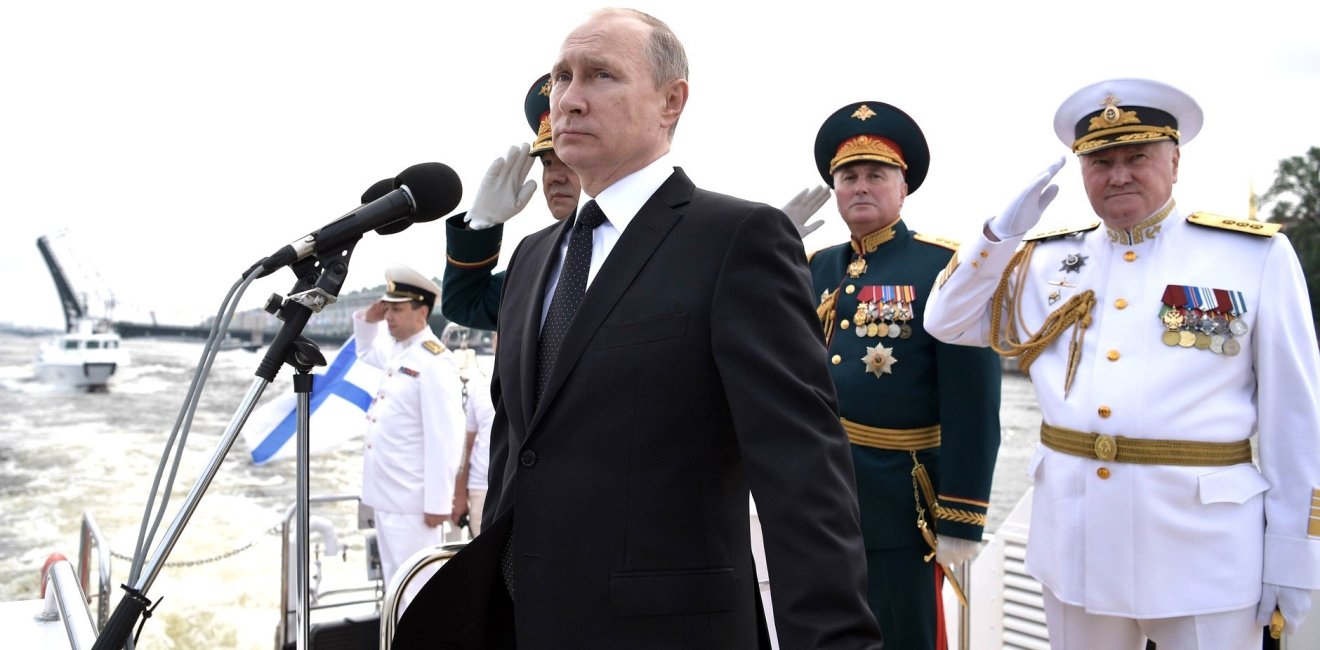What Does Putin Want? To Maintain His Power, No Matter What
A big win for Putin in the March election would be a victory for the Russian autocratic state, writes Will Pomeranz.
A big win for Putin in the March election would be a victory for the Russian autocratic state, writes Will Pomeranz.

Elections are usually times of renewal. In Russia, however, they are acts of confirmation: The only real suspense about the March 2018 presidential election is whether President Vladimir Putin will receive 70 percent or 80 percent of the vote.
True, he has not yet announced his candidacy. But it is not too early to ask what Putin will do with this overwhelming mandate.
He will undoubtedly make bold campaign promises about economic growth, big infrastructure projects, the expansion of social programs, legal reform and Russia’s major role in international affairs. Putin’s domestic and international priorities, however, are unlikely to change. If they do, it would be a sign of weakness, not strength. He has built up his regime over 18 years, and dismantling the system — or any part of it — would require significantly more work than maintaining it.
Putin also surely understands that reform is the moment of greatest vulnerability for a Russian leader (just ask Mikhail Gorbachev). And Putin’s intent is always to maintain control, as recent prosecutions attest.
Putin went from being a largely non-ideological technocrat in his first two terms to being to a staunch conservative nationalist, sacrificing political pluralism and economic diversity. His third-term policy choices have narrowed his options.
At the top of his fourth term “to do” list is finding the money to keep the ship of state afloat.
At the top of his fourth term “to do” list is finding the money to keep the ship of state afloat. Putin has been plagued by revenue shortfalls, largely due to the continuing economic sanctions by the U.S. and EU and the dramatic drop in oil prices. He attempted to cajole offshore money home by offering an amnesty and tried taxing foreign companies owned by Russian citizens. Nothing worked.
So he has recently pursued more creative ways of raising money, most notably by demanding that state-owned companies pay 50 percent of their profits in dividends. This money largely finds its way back to the state treasury.
Putin could, of course, get lucky: The price of oil and other raw materials could rise. But for the immediate future, Russia faces low growth, declining foreign investment, permanent U.S. sanctions, high military expenditures and an aging population that expects state support. Balancing these core economic and social concerns — and their related constituencies — remains a high-wire act that is bound to occupy Putin’s time and attention.
The most challenging political issue confronting Putin’s fourth term will also be a hangover from his current one: corruption. It has proved the one issue that galvanizes the Russian people into protest.
In March 2017, large anti-corruption demonstrations filled the streets of more than 80 Russian cities. Putin responded by sharply criticizing these attempts to politicize the corruption issue. His comments, however, only served to highlight the inadequacies of his own efforts to fight illicit activities.
Putin must realize he needs to stay ahead of this corruption issue. Otherwise, it could potentially unite an otherwise splintered opposition.
The corruption issue feeds into what is likely to be a key election talking point: legal reform. A host of programs are being talked about, including: creating a special administrative tribunal to address bottlenecks in the law; reworking Russia’s appellate system; and decreasing the burden of government agencies’ repeat (i.e., extortionate) inspections on business.
Recent actions show that, for all his talk of reform, the Russian president needs a compliant legal system that will send a political message when required. Rosneft, the state-controlled oil giant headed by Putin’s longtime friend Igor Sechin, recently won major damages against the Russian conglomerate Sistema for alleged asset stripping. This victory, along with the government’s earlier detention of Sistema’s owner, Vladimir Yevtushenkov, reminds all other oligarchs that they need to toe Putin’s line. If they don’t, their wealth and even their freedom could be threatened.
The corruption trial of the former minister of economic development, Alexey Ulyukaev, sends a similar warning to government officials — with the added emphasis that even high-ranking ministers are not exempt.
The most disconcerting recent development on the legal front, however, has been the arrest of the prominent Russian theater director Kirill Serebrennikov on embezzlement charges. Serebrennikov, a cutting-edge artist, mounts productions that deal with issues like homosexuality, violence and alienation, all of which run afoul of Putin’s increasingly conservative politics. The Kremlin insists that the case is about finances. But it is obviously about much more than that.
“No one doubts that we are witnessing a political show trial,” said Irina Prokhorova, the well-known literary critic and cultural historian, “that marks the end of the independence of post-Soviet culture.”
Serrebrennikov’s arrest sends an ominous signal about Putin’s future plans. A crackdown on the arts means that Putin sees potential enemies everywhere, beyond even politics and business, signaling dire consequences for one of the few remaining open public spaces in Russian life.
So if the domestic agenda holds little prospects for change, what about foreign affairs?
So if the domestic agenda holds little prospects for change, what about foreign affairs? Again, the chances for a major breakthrough looks remote. Putin wants a negotiated settlement in Syria; so far, all he has to show for it is a limited ceasefire with the United States in the southwest part of the country.
A resolution of the Ukrainian standoff appears equally unlikely, particularly with Washington raising the possibility of sending advanced defensive weapons to Ukraine. Putin does not necessarily want to escalate the crisis — Russia quickly rejected a recent attempt by the separatists to declare the independent country of Malorossiyaor “Little Russia.” Putin has also proposed UN peacekeepers for Ukraine. But no one should expect him to back down if the current balance of forces is challenged, no matter the consequences.
History shows that Russia’s “liberal” alternative only presents itself when the state is at its weakest. A big win for Putin in the March election, however, would serve as a victory for the Russian state in its current autocratic form. Unless a severe crisis forces Putin's hand, he is not for turning anytime soon.
This article was originally published on nbcnews.com
The opinions expressed here are solely those of the author.


After more than 50 years as a vital part of the Wilson Center legacy, the Kennan Institute has become an independent think tank. You can find the current website for the Kennan Institute at kennaninstitute.org. Please look for future announcements about partnership activities between the Wilson Center and the Kennan Institute at Wilson Center Press Room. The Kennan Institute is the premier US center for advanced research on Eurasia and the oldest and largest regional program at the Woodrow Wilson International Center for Scholars. The Kennan Institute is committed to improving American understanding of Russia, Ukraine, Central Asia, the South Caucasus, and the surrounding region through research and exchange. Read more



